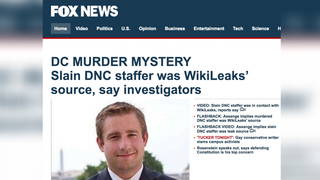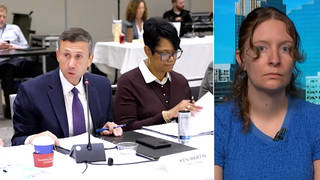
Guests
- Ashley WilliamsBlack Lives Matter activist who interrupted Democratic presidential candidate Hillary Clinton during a private fundraiser Wednesday night in Charleston, South Carolina.
Ahead of Saturday’s South Carolina Democratic primary, a Black Lives Matter activist interrupted Democratic presidential candidate Hillary Clinton on Wednesday during a private fundraiser in Charleston. Ashley Williams held a banner reading, “We have to bring them to heel,” a reference to controversial statements Clinton made in 1996 about some youth, whom she called “superpredators.” Williams then confronted Clinton, saying, “I am not a superpredator.” Williams joins us to discuss why she was compelled to act. “She’s had 20 years to answer these questions” but has yet to do so, Williams notes.
Transcript
JUAN GONZÁLEZ: Democrats will also go to the polls on Super Tuesday. But before that, the South Carolina Democratic primary takes place tomorrow. Presidential candidates Bernie Sanders and Hillary Clinton have been campaigning in the state, and on Wednesday, a Black Lives Matter activist interrupted Democratic presidential candidate Clinton during a fundraiser in a private home in Charleston. During the event, Ashley Williams held a banner reading, quote, “We have to bring them to heel”—a reference to controversial statements Clinton made in 1996 about some youth, whom she called “superpredators.” Williams then confronted Clinton, saying, quote, “I am not a superpredator.”
ASHLEY WILLIAMS: I’m not a superpredator, Hillary Clinton.
HILLARY CLINTON: OK, fine. We’ll talk about it.
ASHLEY WILLIAMS: Can you apologize to black people for mass incarceration?
HILLARY CLINTON: Well, can I talk? OK, and then maybe you can listen to what I say.
ASHLEY WILLIAMS: Yes, yes, absolutely.
HILLARY CLINTON: OK, fine. Thank you very much. There’s a lot of issues, a lot of issues in this campaign. […]
ASHLEY WILLIAMS: I know that you called black youth superpredators in 1994. Please explain your record. Explain it to us. You owe black people an apology.
HILLARY CLINTON: Well, I’ll tell you what, if you will give me a chance to talk, I’ll—I’ll tell you something. You know what? Nobody’s ever asked me before. You’re the first person to ask me, and I’m happy to address it, but you are the first person to ask me, dear. Um, OK, back to the issues.
JUAN GONZÁLEZ: That was Black Lives Matter activist Ashley Williams confronting Hillary Clinton at a private fundraiser Wednesday night. She was then escorted away. Williams says a friend contributed $500 so she could attend the private event. The protest was in response to controversial comments Clinton made while speaking at Keene College in New Hampshire in 1996.
HILLARY CLINTON: They are often the kinds of kids that are called superpredators—no conscience, no empathy. We can talk about why they ended up that way, but first we have to bring them to heel.
AMY GOODMAN: Well, on Thursday, Hillary Clinton expressed regret for her choice of words. In a statement to The Washington Post, she wrote, quote, “In that speech, I was talking about the impact violent crime and vicious drug cartels were having on communities across the country and the particular danger they posed to children and families. Looking back, I shouldn’t have used those words, and I wouldn’t use them today,” she said.
Well, Ashley Williams’ question to Clinton, and the candidate’s response, has generated an online discussion about Clinton’s changing stances over the years, using the hashtag #WhichHillary.
For more, Ashley Williams joins us herself from Charlotte, North Carolina.
Ashley, welcome to Democracy Now! Describe what took place on Wednesday. You went to Charleston, South Carolina, to a—was this a private home?
ASHLEY WILLIAMS: Yes, this was someone’s private home, Amy.
AMY GOODMAN: And talk about what you did.
ASHLEY WILLIAMS: So this was a high-value fundraiser at someone’s private residence in Charleston, South Carolina. And there was someone who kind of introduced Hillary and talked about the ways in which she has shown up for racial justice for the state of South Carolina in the past in terms of the Walter Scott case and the Charleston shooting. And then they talked about how she supported body cameras in the state of South Carolina. And then, Hillary began to speak. And soon after she began to speak, I interrupted her for the purpose of addressing her inconsistencies with her record. I wanted to know which Hillary Clinton can we trust today. Is it the Hillary Clinton from 1994? Is it the Hillary Clinton from 2008? Or is it this refined Hillary Clinton that allegedly shows up for racial justice that we know in 2016? I’m just not sure that we can trust her and the things that she’s saying today.
JUAN GONZÁLEZ: And, Ashley, now that you’ve heard of the response of Clinton in The Washington Post, do you think that there’s been some recognition on her part, or is this just a public relations attempt to dampen the impact of your protest?
ASHLEY WILLIAMS: Yeah, so I’d like to say that I think that her response is insufficient, and it doesn’t really address my real concerns. She apologized specifically for her word choice and the words that she chose to use, but I want her to apologize to black people for mass incarceration. I want her to apologize to black communities and other communities of color for supporting the policies. So not just like using specific words, but supporting those policies—that is what I want from her, and that’s not something that I’ve seen at this point.
AMY GOODMAN: Ashley, what kind of response did you get from other people at the fundraiser, or were you taken right out?
ASHLEY WILLIAMS: People were saying that I was trespassing. People were saying that I was being rude. And people were saying that I was being inappropriate.
JUAN GONZÁLEZ: And was there any attempt by anybody in the Clinton campaign to reach out to you afterwards at all?
ASHLEY WILLIAMS: Not at all.
AMY GOODMAN: Can you talk about what you want these candidates to address right now—not only Hillary Clinton, Bernie Sanders, also the Republicans?
ASHLEY WILLIAMS: Yeah. I want each candidate to address the inconsistencies that may exist with their record, especially in terms of policies that affect communities of color and black communities and mass incarceration. But I want to say, Amy, that I think that like the voters have a responsibility, as well. So it’s not just the candidates that need to kind of reconcile their records for us or explain themselves to us, but it’s our job to look for these inconsistencies and the consistencies. And it’s our job to make an informed decision at the polls at some point.
AMY GOODMAN: Ashley Williams, I want to thank you very much for being with us. Last question, and that was, Hillary Clinton said you’re the first person to raise this with her. What exactly was she saying? And did that surprise you?
ASHLEY WILLIAMS: So I don’t think that what she’s saying is true. And I don’t think that I’m the first person to have asked her this question. I think that black communities and communities of color have been asking her these questions for 20 years, Amy. And I also think that she’s had 20 years to like answer these questions. And at this point, like I said, we don’t have any answers, and we don’t have an apology, which is what we really deserve.
AMY GOODMAN: Ashley Williams, Black Lives Matter activist who interrupted Hillary Clinton during a private fundraiser Wednesday night in Charleston, South Carolina, South Carolina where the Democratic presidential primary will take place on Saturday. Thanks so much for joining us.












Media Options